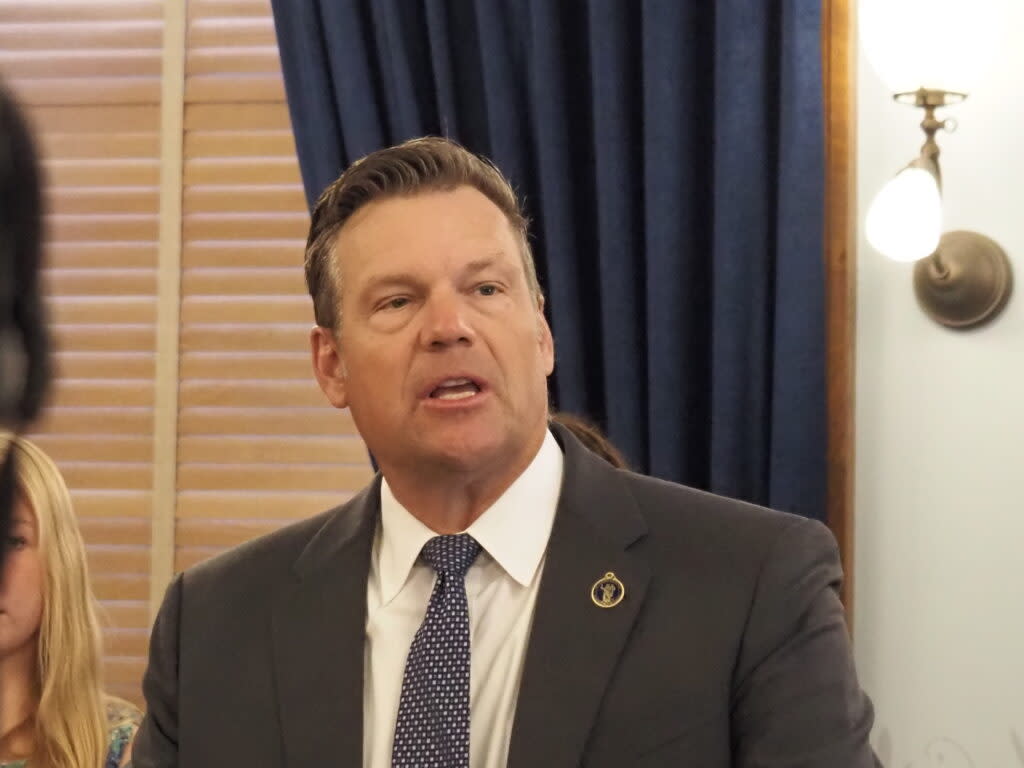Kris Kobach glorifies free speech. That doesn’t let him off the hook for persecuting trans kids.

- Oops!Something went wrong.Please try again later.
- Oops!Something went wrong.Please try again later.
Kansas Attorney General Kris Kobach announced his plan to sue President Joe Biden's administration over new Title IX rules on Tuesday. (Rachel Mipro/Kansas Reflector)
Kansas Attorney General Kris Kobach gave a predictable news conference Tuesday, announcing plans to sue the Biden administration over new rules protecting LGBTQ+ students and retreading tired conservative attacks on transgender athletes. I’d expect nothing less from the walking punchline of a politician who managed to lose a high-profile voting rights case along with shambolic campaigns for governor and U.S. senator.
But he also said something important during the event, something that I agree with deeply.
“I would never say that a trans individual can’t speak out and say what he or she believes about the effect of whatever therapies they’ve undergone,” Kobach said. “But everybody else has a right to speak out. And I think all of us who observe or play in athletic events, we have a right to say what we believe about the fairness of that event, and so no one should be canceled for saying anything in America.
“This used to be a country where anybody can speak their mind. Everybody lived by the view that it’s America, you can say what you want, here’s open debate, and no one’s going to be punished for expressing their beliefs, especially beliefs just about sports, or beliefs about politics.”
Yes. We should prize open debate and free expression. I’ve said just that in many columns about the law enforcement raid targeting the Marion County Record. Back in December, I wrote that Kobach should express as much enthusiasm for the First Amendment as he did for the Second, so good on him for taking the stand. (He might want to think about how that applies to college campuses, but I can only write so many columns at a time.)
I wonder if he thought through the implications, though.
Speech and penalties
Lots of people express controversial opinions. For instance, back in the 1980s, some college students stood against calls for U.S. businesses to disinvest from apartheid South Africa.
“Recent turmoil in South Africa has prompted some Americans to urge the disinvestment of American corporations. Such a policy would be both ineffective and irresponsible,” wrote a 20-year-old Kobach in a letter to the editor published by The Topeka Capital-Journal. “Following other paths would be wiser. We must strive to end the injustices of apartheid, but pursuing disinvestment can only hurt South Africa’s blacks.”
I believe that Kobach should have been able to write that letter and share it with the world. It gives us a glimpse into the mind of one of Kansas’ most prominent politicians as he prepared for a career. He even wrote a book about businesses in South Africa!
Speaking of his career, Kobach ran for governor in 2018 after years in the Secretary of State’s Office. During the run, he faced criticism from political consultants who claimed his campaign had white nationalists on the payroll. He and the campaign strenuously denied the allegations, and I’m glad they had the opportunity to do so.
I’m also glad that whoever worked for the Kobach campaign has an opportunity to share his or her views publicly. Free speech works in multiple directions, right?
Someone else who exercised her right to speak — and authority to level penalties — was U.S. District Judge Julie Robinson. She’s the judge who found that Kobach had violated court rules while attempting to defend a Kansas law that disenfranchised voters.
“The disclosure violations set forth above document a pattern and practice by Defendant of flaunting disclosure and discovery rules that are designed to prevent prejudice and surprise at trial. The Court ruled on each disclosure issue as it arose, but given the repeated instances involved, and the fact that Defendant resisted the Court’s rulings by continuing to try to introduce such evidence after exclusion, the Court finds that further sanctions are appropriate under Rule 37(c)(1), which permits, in addition to exclusion of the evidence, ‘other appropriate sanctions,’ ” the judge wrote in her ruling.
“It is not clear to the Court whether Defendant repeatedly failed to meet his disclosure obligations intentionally or due to his unfamiliarity with the federal rules,” she added. “Therefore, the Court finds that an additional sanction is appropriate in the form of Continuing Legal Education.”
Speech in court can lead to some real-life consequences, apparently.
Freedom and decency
The U.S. Constitution ensures that reporters and columnists can write stories and columns about Kobach and his career. Journalists covered the courses he took, when he finished and who paid for them. Six years later, the same protections allow me to write this column about the attorney general’s current actions and how they connect to his past behavior.
In other words, Kobach certainly has the right right to criticize other people, be they migrants or transgender folks. But migrants and transgender people have an equal right to criticize him and share the effects his demagoguery have on their lives. That doesn’t mean he’s been “punished” or “canceled.” It means others enjoy and employ the same free speech rights that he so prizes.
If the attorney general and anyone else inspired by his words wants to dedicate themselves to free speech, they have my praise and respect. That doesn’t mean I will praise or respect bad-faith arguments. That doesn’t mean I will praise or respect discrimination against fellow human beings. That doesn’t mean I will praise or respect charlatans who shame and denigrate those who are different.
We all enjoy free speech. But that doesn’t give anyone a pass on basic human decency.
When Kobach opposed divestment from businesses in South Africa as a college student, he was eager to state that he still believed apartheid was bad. When his gubernatorial campaign was accused of paying men with ties to white supremacy, he was eager to state that he did not hold racist beliefs. Is he willing to similarly say now that he believes discrimination against LGBTQ+ students is wrong, even if he disagrees with the Biden administration’s methods for addressing the issue?
I asked his spokeswoman this exact question. I didn’t hear back.
Clay Wirestone is Kansas Reflector opinion editor. Through its opinion section, Kansas Reflector works to amplify the voices of people who are affected by public policies or excluded from public debate. Find information, including how to submit your own commentary, here.
The post Kris Kobach glorifies free speech. That doesn’t let him off the hook for persecuting trans kids. appeared first on Kansas Reflector.



